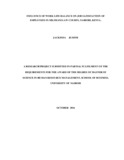| dc.description.abstract | Work-life balance is a satisfactory level of involvement between the multiple roles in a person‟s life. The study aims at determining the influence of work life balance on job satisfaction in Milimani Law Courts, Nairobi. The study is important to the policy makers, since it provides useful information which can be used for government leaders when they make policy decisions regarding the implementation of work life balance programs. The Judiciary would find the study findings resourceful. This study provides the Milimani Courts with a new way of working flexibly which leads to job satisfaction and better work life balance for the employees. To the academics, the study would be an invaluable source of material and information on job satisfaction. The study is guided by Discrepancy Theory and Compensation Theory. The study employed a descriptive cross-sectional research design. A descriptive survey enables the researcher to describe the characteristics of the variables of interest. It is therefore justified that descriptive design is most suited and justifiably adopted in this study. This study focused on 200 Milimani Law court employees of the following cadres; Registrars, Magistrates, Executive Officers, Clerical Officers, support staff, Accountants, Human Resource Officers, ICT Officers, Procurement Officers and Librarians. This was a census study. The respondents were all the 200 employees working with Milimani Law court. Primary data was collected by means of a semi- structured questionnaire. The data collected was analysed using descriptive statistics (measures of central tendency and measures of variations) to achieve the objectives of the study. The study further adopted a simple linear analysis model to establish the strength and direction of the relationship between the independent variables and the dependent variable. The study concludes that there is a positive relationship between job involvement and job satisfaction in Milimani Law Courts. Employees are involved in their job if they enthusiastically take part in the job related matters, they see job as most important and significant part in life, and recognize performance as main feature of their self-worth. The study further concludes that there is a negative relationship between job stress and job satisfaction in Milimani Law Courts. On work role ambiguity the study concludes that work role ambiguity has a negative relationship on job satisfaction in Milimani Law Courts. On job satisfaction, the study concludes that, physical working conditions, co- workers, employee output, satisfactory salary and promotional opportunities determine job satisfaction in Milimani Law Courts. This study recommends to the ministry of labour to give particular attention to processes and procedures in organizations. The study recommends that the management of the Law Courts and organizational leaders to consider creating expanded formal and informal opportunities for employees to interact with their peers in collaborative ways. | en_US |



